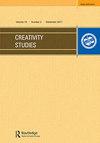创造性社会的政治传播:公共政策的各个方面
Q1 Social Sciences
引用次数: 0
摘要
本文分析了立陶宛的创造性社会政治传播。创意社会(作为一种独立的社会类型)的基础是当代社会中越来越多的创意阶层(自2000年以来开始占主导地位),以及最近出现的创意产业现象。当代科学研究主要受限于创造性社会特征、创造性社会经济学和创造性产业;然而,公共政策工具缺乏创造性的社会分析。本文旨在建立一个创造性社会政策的模型,并根据该模型评估立陶宛的实践,确定该政策的实施方向。首先,概括了研究者对创造性社会的态度,介绍了创造性社会的特点,以及这种政策的重要性、替代方案和可能的方向。其次,通过模拟和案例研究(立陶宛创新社会政策的确定和实施方向),建立了创新社会政策模型(该模型展示了其他国家如何形成和实施创新社会政策),并确定了该政策的实施方向。本文总结了作者准备的博士论文的主要成果。进一步研究的方向可以是分析创造性社会政策的方向,调查梦想社会(作为一种未来类型)。本文章由计算机程序翻译,如有差异,请以英文原文为准。
POLITICAL COMMUNICATION OF CREATIVE SOCIETY: THE ASPECTS OF PUBLIC POLICY
The article analyses creative society political communication in Lithuania. Creative society (as a separate society type) is grounded by the increasing (and starting to dominate since 2000) amount of creative class in contemporary society, and by recent phenomenon of creative industries. Contemporary scientific research is mainly limited by creative society features, creative society economics and creative industries; however, there is lack of creative society analysis by public policy instruments. The article aims to make a model of creative society policy and, having evaluated the Lithuanian practice according to it, to define directions of implementation of this policy. Firstly, attitudes of researchers towards creative society were generalized, presenting its features, and the importance, alternatives, and possible directions of such policy. Secondly, having performed simulation and the case study (directions’ determination and implementation of creative society policy in Lithuania), the model of creative society policy was made (this model demonstrates how creative society policy might be formed and implemented in other countries), and directions of implementation of this policy were defined. The article summarizes main results of author’s prepared doctoral dissertation. Directions for further research can be analysis of directions of creative society policy, investigation of dream society (as a future type).
求助全文
通过发布文献求助,成功后即可免费获取论文全文。
去求助
来源期刊

Creativity Studies
Social Sciences-Cultural Studies
CiteScore
3.20
自引率
0.00%
发文量
38
审稿时长
15 weeks
期刊介绍:
Creativity Studies accepts original research articles with a focus on communication within the creative society. The journal welcomes contributions from scholars from diverse disciplines such as philosophy, sociology, history, political, communication and information sciences. Creativity Studies also publishes survey papers and descriptions of academic events in this area. The journal issues will be organized around different issues on creativity.
 求助内容:
求助内容: 应助结果提醒方式:
应助结果提醒方式:


